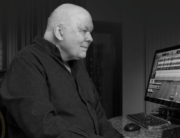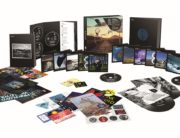BY MIKE METTLER – JANUARY 21, 2017
 Over in my weekly Audiophile column for Digital Trends, Jade Puget, guitarist and co-producer for California-bred emo-punks AFI, and I discussed the band’s new release on Concord, AFI (The Blood Album), his favorite plug-ins and programming options, balancing tempo shifts between songs both live and on record, and reconciling hi-res-audio desires with the streaming culture.
Over in my weekly Audiophile column for Digital Trends, Jade Puget, guitarist and co-producer for California-bred emo-punks AFI, and I discussed the band’s new release on Concord, AFI (The Blood Album), his favorite plug-ins and programming options, balancing tempo shifts between songs both live and on record, and reconciling hi-res-audio desires with the streaming culture.
We also discussed a few other topics in that far-ranging conversation, which will appear here now exclusively on The SoundBard. But before we get to those exclusive bits, let us first review the hi-res-oriented thread of that conversation:
Mike Mettler: The phrase I keep coming back to for describing this record is “sound design.” This is also the kind of album I like hearing in hi-res. Did you cut things at 96/24, or. . .?
Jade Puget: I’m always a fan of using the highest resolution possible. In the studio, we’re using all-analog stuff and outboard gear, but when I bring in my layers and the guitar work I’ve done at home, it’s always been put down at 96/24.
It’s difficult, because the internal architecture of Ableton is 32-bit, so I’m always reading the threads to see if it’s best to bounce it down and dither it internally, or dither it externally. [Dithering is often implemented to reduce distortion and noise in digital recordings.] At those resolutions, it’s difficult to hear the difference between 32-bit and 24-bit — at least for me it is. I’m still kind of uncertain about what to do about that.
Mettler: I think the crux of the matter is you can definitely tell the difference between 16-bit and 24-bit. But on the other side of that, I think it’s hard to tell the difference between 96k and 192k. I think I’m a pretty astute listener, but it’s hard for me to tell the differences there, you know?
Puget: Yeah. You’d have to have some real high range to your hearing to hear that. I think with a lot of that stuff, you can only hear the differences in the upper-frequencies.
Mettler: I’ve had some older musicians tell me about the differences they can hear at 192, and I can only nod and think, “Well, you’re a lucky man.”
Puget: You wonder about that with people who have been in and around music for a long time. The upper-frequencies are the first to go, just naturally.
I remember reading an interview with Tony Visconti [longtime producer for David Bowie and T. Rex], and he had lost the upper range just from mixing and monitoring for so long. It’s weird for someone older to say they hear the differences.
Mettler: A lot of people are going to stream The Blood Album. Are you cool with that?
Puget: I guess at this point it’s sort of moot whether I’m cool with it or not, because it’s going to happen anyway. I realize things are moving in a way I don’t necessarily want them to move, but a lot of people are going to stream it. I was just reading that vinyl sales have surpassed digital sales, so we’re in a very upside-down, strange world.
That streaming resolution isn’t ideal for the listener, but then again, the listener may not care all that much about super-high fidelity. Unfortunately, that’s just the way it is. But the listeners who are listening on a streaming device or through a streaming service wouldn’t listen to high fidelity anyway, so maybe it doesn’t matter.
Mettler: It does depend on the listener. Hi-res streaming is finally happening now, and you can go to a service like HDtracks and download hi-res versions of many of today’s album releases. We don’t have to accept low-level MP3s and miss some of the details and subtleties you’ve put into your mixes.
Puget: At the very least, I would hope that people would want to listen to the highest quality they could get their hands on, even if it’s at 48/24, or something.
… And now, here’s the SoundBard-exclusive segment of our interview:

AFI in B&W. Photo by Jiro Schneider.
Mettler: Besides stereo, I like listening to surround sound mixes, and I don’t know if you’ve gotten into that at all.
Puget: I haven’t, but that would be awesome if I had a surround setup. I tend to listen to music on studio monitors. But my father-in-law is into the best DACs and the most pristine way to get audio through your ears, and he has a great selection of headphones. He’s into getting the least amount of loss between the sound source or file and what he’s hearing it on. He’s into that world of paying thousands of dollars for these high-end DACs, but I’m not really there yet.
Mettler: That requires a nice, deep dive, but once you do, it’s hard to go back. It’s an optimal result after you chase the audio dragon like that, and then achieve your sound-quality goals. Anyway, earlier, you had mentioned how you had to go back and fix a clipping problem in some of the album’s early final mixes. I can only imagine what would have happened to all those layered vocals you have on “The Wind That Carries Me Away,” something that’s one of the band’s signatures.
Puget: Backing vocals for AFI have been a very big part of our career — the big group vocals. Usually when it came time to do the backing vocals, we’d have all of our friends come to the studio. A lot of them aren’t very good singers; they just happen to be friends, and we were just trying to wrangle this disparate group of people into some kind of decent-sounding group. It was fine. But for that song, Davey [Havok, AFI vocalist] and I did all of the backing vocals. It was just two stacked voices.
Mettler: Oh, that’s interesting; I didn’t realize it was only the two of you there. You told me before that one of the first things you remember listening to growing up was the first album by The Beatles. Do you feel some of their sensibilities have filtered over into your own writing — their sense of melody and harmony?
Puget: I’d like to think so! I’m a huge Beatles nut, but strangely enough, I don’t know if it ever came into my own songwriting — unless it was through some weird osmosis. (both laugh)
Even in the early Beatles stuff, the songwriting was very interesting and complex and advanced. I love that stuff, but it never seems to find its way into my music.
Mettler: Well, I don’t know about that. I mean, [Paul] McCartney did write a number of Beatles songs that had that waltz feel to them. Maybe “Snow Cats,” which is in 6/8, and “Michelle” have a connection between them, somehow.
Puget: (chuckles) I guess that could be true, yeah!

AFI, standin’ tall.
Mettler: You also have a few side projects — Blaqk Audo and XTRMST.
Puget: I do, I do. I don’t like free time, apparently. (chuckles)
Mettler: (laughs) Well, we’re the ones who win, ultimately.
Puget: Thank you.
Mettler: In your spare time, think about doing a surround mix. That would be perfect for Blaqk Audio.
Puget: Yeah, that’s a good idea. I’m working on a new Blaqk Audio record right now, so maybe I’ll do some songs with more spaciousness in them for that purpose.
It’s cool to know there are people like yourself who actually care enough about audio to listen in such detail and are people who truly appreciate the work that goes into what we’re doing.






